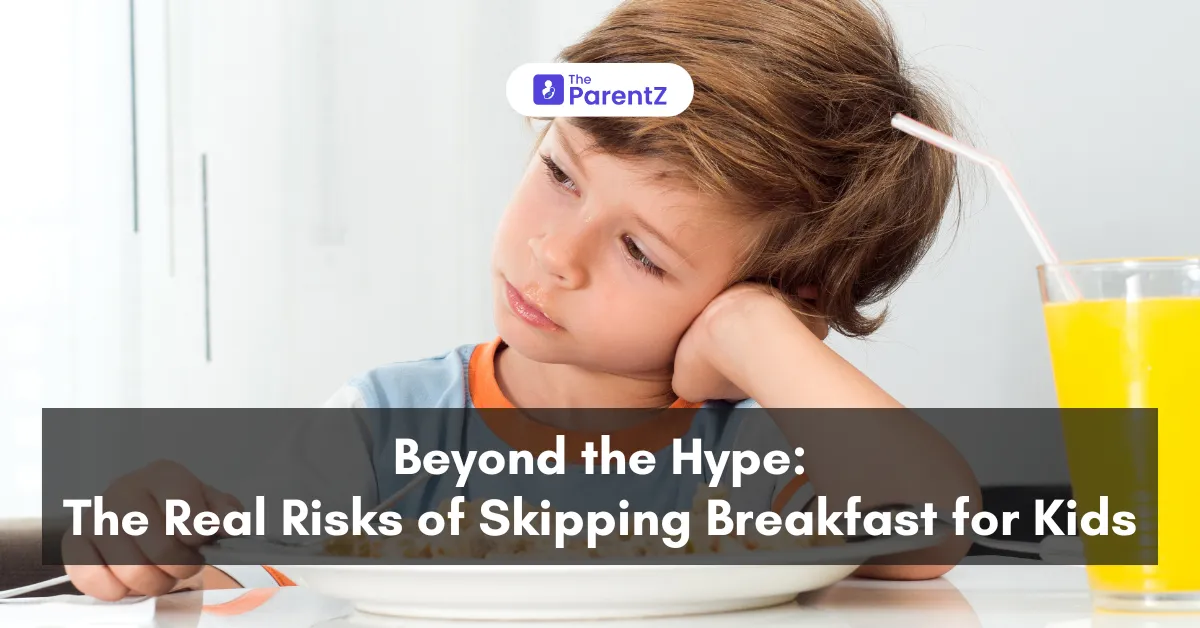Between getting everyone dressed, packing bags, and making sure homework is done, breakfast can sometimes feel like one more battle parents don't have the energy to fight. When a child says, "I'm not hungry" or "I don't want to eat," it's tempting to let it slide.
But before you let your child rush out the door on an empty stomach, let's explore the risks of skipping breakfast and why it matters more than you might think.
Risks of Skipping Breakfast for Kids
The Missing Nutrients
One of the most significant risks of skipping breakfast is missing out on essential nutrients. A scientific review highlighted that many schoolchildren who skip breakfast struggle to get the necessary nutrients for healthy development and learning. Teenagers, especially girls and children from lower-income families, are particularly vulnerable. Missing a nutritious breakfast can make it harder for kids to get enough calcium and iron, which are important for growth and overall health. Breakfast is a great time to consume fiber, which helps with weight control and constipation and prevents heart disease, diabetes, and certain cancers.
Impact on Physical Health
When children skip breakfast, their bodies are essentially running on empty after a long night's sleep. Think of it as trying to drive a car with no fuel – things might seem fine at first, but problems start showing up pretty quickly. Research consistently shows that breakfast-skipping kids often experience:
- Mid-morning energy crashes that make them irritable and unfocused
- Headaches and dizziness, especially during physical activities
- Slower metabolism, which ironically can lead to weight gain over time
- Poor muscle strength and endurance during morning sports or PE classes
- More frequent visits to the school nurse complaining of stomach aches
Impact on Academic Performance
The old saying about breakfast being brain food has solid science behind it. When kids skip breakfast, their brains are trying to function without glucose – their primary energy source. This leads to:
- Difficulty concentrating during morning lessons
- Slower problem-solving abilities
- Poorer memory retention
- Lower test scores, especially in morning exams
- Reduced creativity and participation in class activities
Impact on Mental and Psychosocial Well-being
This is something that doesn't get discussed enough. Hungry kids aren't just physically affected – their emotional well-being takes a hit, too. Research reveals these connections between breakfast-skipping and emotional health:
- Increased irritability and mood swings
- Higher levels of anxiety, especially in social situations
- Difficulty regulating emotions
- More frequent conflicts with peers and siblings
- Lower self-esteem when they can't perform well in morning activities
The Long-Term Health Risks
While a few missed breakfasts won't cause lasting damage, regular breakfast-skipping can lead to some concerning long-term issues:
- Higher risk of developing unhealthy eating patterns
- Increased likelihood of nutrient deficiencies, especially in calcium and fiber
- Greater risk of developing type 2 diabetes later in life
- Higher chances of struggling with weight management
- Potential for developing disordered eating habits
The Social Impact
There's also a social dimension to breakfast-skipping that often gets overlooked:
- Kids missing out on valuable family time during morning meals
- Reduced opportunities to learn table manners and social eating skills
- Missing chances to develop healthy eating habits through observation
- Feeling left out when classmates discuss their breakfast or morning routines
What Can Parents Do?
As a parent, you can take steps to help your child develop a healthy habit of eating breakfast:
- Lead by Example: Make breakfast a family affair. When your kids see you eating a healthy breakfast, they're more likely to follow suit.
- Keep it Quick and Easy: Prepare quick and easy breakfast options for busy mornings.
- Plan Ahead: Prepare breakfast components the night before. Overnight oats, pre-cut fruit, or hard-boiled eggs can save time in the morning.
- Offer Variety: Provide a variety of healthy breakfast choices to keep things interesting.
- Involve Your Kids: Let your kids help with breakfast preparation.
Perfection isn't the goal here. Even a small breakfast is better than no breakfast at all. Some kids genuinely take longer to feel hungry in the morning, and that's okay. The key is finding what works for each child and family's schedule while ensuring they get the nutrition they need to thrive.
If a child consistently refuses breakfast or shows a strong aversion to morning eating, it might be worth discussing this with their pediatrician. Sometimes, there could be underlying issues like anxiety or digestive concerns that need addressing.
Conclusion
While skipping breakfast occasionally won't cause immediate harm, making it a regular habit can impact a child's health, learning, and well-being in various ways. The good news is that with some planning and flexibility, families can find a morning eating routine that works for everyone – even if it doesn't look like the traditional sit-down breakfast shown in TV commercials.





Be the first one to comment on this story.